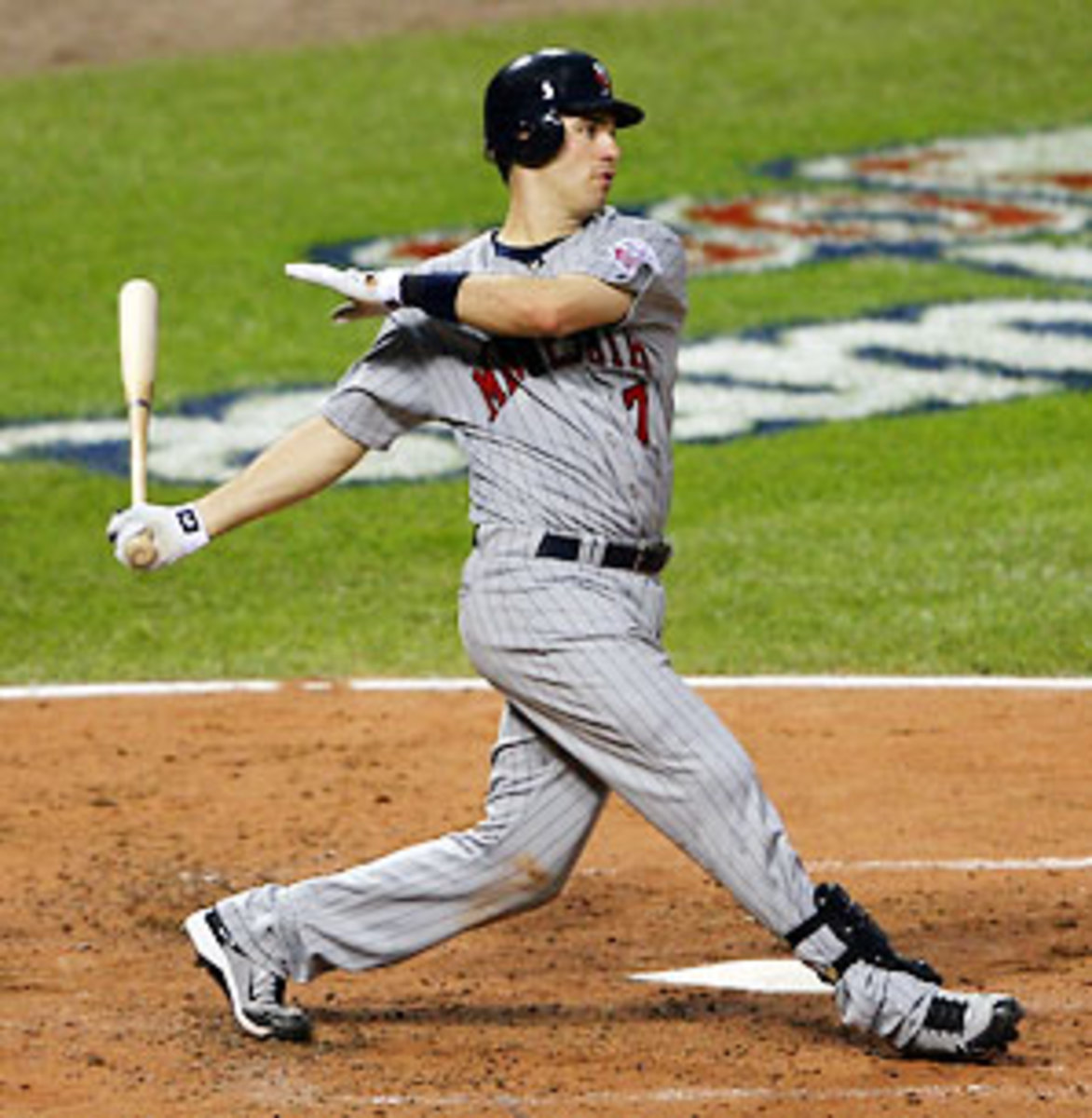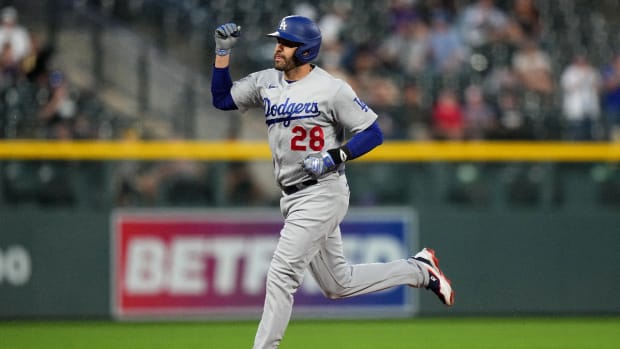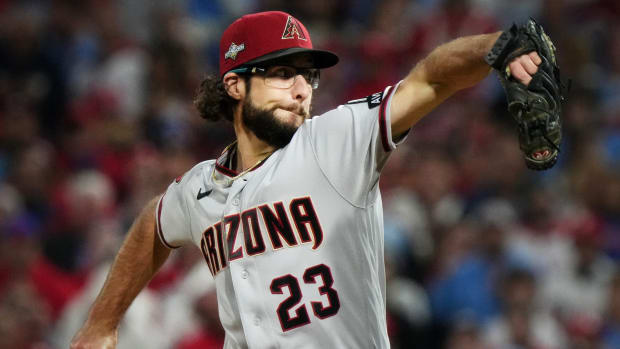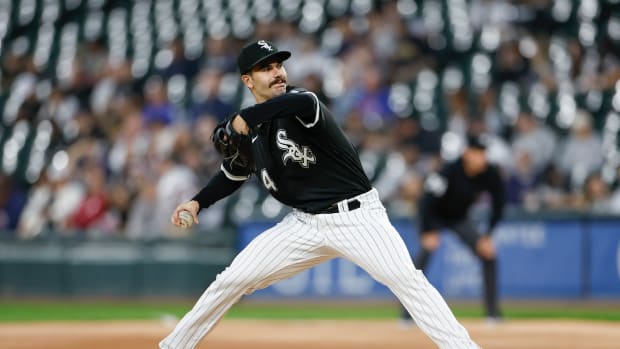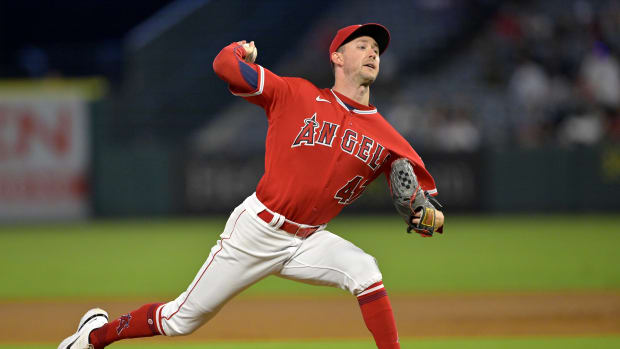Experts' Awards Picks
Tom Verducci: Joe Mauer, Twins.Nobody is in a class with Joe Mauer, a guy who led the league in the modern triple crown (batting, on-base and slugging averages) and won a Gold Glove while playing the most demanding position for a division winner. That makes three batting titles for Mauer, and three for every other catcher in baseball history combined.
Jon Heyman: Mauer.He led the American League in all the percentage categories (batting average, slugging percentage and on-base percentage) and led the Twins into the playoffs. The consummate pro. Easy call.
Ted Keith: Mauer.Cry not for Derek Jeter, he of the 10 All-Star Games, $189 million contract, superstar lifestyle and oh, yes, five World Series wins. But for the second time in four years, Jeter is likely to lose out on the MVP award to a player from the small-market Twins. Just as in 2006, when he finished second to Justin Morneau, Jeter's best efforts this season (.334, .406 OBP, 30 steals, 212 hits, 107 runs) are extremely good, but not good enough to win him his first MVP honor. Instead, the hardware goes to Mauer, who became the first American League player in 29 years to lead the AL in batting average, on-base percentage and slugging percentage. With Morneau sidelined the last three weeks by injury, Mauer helped carry the Twins to a remarkable comeback resulting in an AL Central title. Mauer also had more home runs (a career high 28) and RBIs (a career high 96) than Jeter, despite not debuting until May 1 because of injury. Score one for the little guy.
Joe Posnanski: Mauer.When the Twins made their late season charge for the playoffs -- and then actually made the playoffs -- they ended the "Mauer didn't play for a winner" argument and left no question. A good-fielding catcher who leads the American League in batting average, on-base percentage and slugging percentage? It had never happened before. Mauer missed 24 games, but his historic season should make him slam dunk MVP.
Ben Reiter: Mauer.You look at his jaw-dropping final numbers -- a baseball-leading .365 batting average, 28 home runs, 96 RBIs, a .444 on-base-percentage -- and you almost forget that a back injury prevented him from playing until May 1. Then you consider that he plays catcher, the game's toughest position, and plays it very well, and that he led a club that had lost former MVP Justin Morneau in September to an unlikely playoff berth, and you don't have to consider anything else.
Joe Lemire: Mauer.When a player leads his league in all three major rate categories (average, on-base percentage and slugging), wins a Gold Glove for his defense at the grueling position of catcher and leads his team to a division crown while the second-best player (in this case, Morneau) misses the season's final month, there should be no debate over the league's MVP. None. Nor will it be entertained here.
David Sabino: Mauer.Despite missing the entire month of April with a bad back, the Twins catcher came back to repeat as AL batting champ (.365), the third hitting crown of his career. He led the majors in on-base percentage (.444) and the AL in slugging (.587), amassing 28 home runs and 92 RBIs for the AL Central champs. Most impressively, he was a driving force behind Minnesota's late-season surge to the division crown without cleanup hitter and '06 AL MVP Morneau.
Tom Verducci: Albert Pujols, Cardinals.Pujols led the league in (deep breath here) on-base percentage, slugging, OPS, runs, total bases, home runs, adjusted OPS, runs created, extra-base hits and times on base. It's not even close.
Jon Heyman: Pujols.This award was decided no more than halfway through the season. Should be a unanimous pick after Pujols didn't come all that far from the from becoming the first National Leaguer to win the Triple Crown since Cardinal Ducky Medwick in 1937. The only real question is who finishes second.
Ted Keith: Pujols.In this, what will become his third MVP season, Pujols may have been the most impressive he's ever been, which, given the astounding numbers he's produced in his nine-year career, is saying something. In fact, rather than point out the many ways Pujols dominated the NL, let us compare him to the only measuring stick he can fairly be judged by: himself. In '09, Pujols batted .327, which was actually tied for the second-lowest of his career, but he had 47 home runs (second-highest of his career), 135 RBIs (second-highest) a .443 on-base percentage (second-highest), .658 slugging (third-highest) and 115 walks (personal best), and he did it all for a division champion and in a lineup that ranked in the middle of virtually every statistical category.
Joe Posnanski: Pujols.He's the best player in baseball, and his typical brilliance (.327 average, led league in on-base percentage, slugging percentage, home runs, runs scored, extra-base hits, etc.) obscures the fact that there were quite a few players in the National League who had great years. Prince Fielder and Ryan Braun in Milwaukee had huge years. Philadelphia's Chase Utley was great, as was Florida's Hanley Ramirez. Pujols was the clear No. 1, though.
Ben Reiter: Pujols.Even an un-Pujolsian finish to the season -- he hit his MLB-best 47th and last homer on Sept. 9, with 21 games to go -- couldn't derail his MVP candidacy. He posted an OPS better than 1.000 for the seventh time in his nine seasons, and he led the NL in not only homers but runs (124), on-base-percentage (.443), slugging (.658) and total bases (374). Until further notice, this award belongs to him.
Joe Lemire: Pujols.Another runaway winner: Pujols is the game's greatest player. He led all of the majors in seven significant categories -- slugging, OPS, runs, total bases, extra-base hits, home runs and intentional walks -- and led the NL in on-base percentage. He was second in the league in doubles and third in walks and RBIs. Oh, and he also did this while leading his team to a central division crown.
David Sabino: Pujols.In 2009 he led the majors with 47 home runs, becoming the only player to begin his career with nine straight 30-homer seasons (including a career-best 10 multi-home run games). He also topped the bigs in runs scored (124), slugging percentage (.658), extra-base hits (93), times on base (310) and total bases (374) and set a major league mark for most assists by a first baseman with 185.
Tom Verducci:Zack Greinke, Royals.Only four men ever posted a lower ERA in the AL since the advent of the DH than Greinke's 2.16: Pedro Martinez (twice), Roger Clemens (twice), Ron Guidry and Jim Palmer. In his nine no-decisions, Greinke had a 2.35 ERA. Felix Hernandez, though, is a very, very close second.
Jon Heyman: Greinke.The only possible knock could be that he pitches in the AL Central. But you know what? He was even better against the best teams. Had a sub-1.00 ERA against AL playoff teams.
Ted Keith: Greinke.As difficult as it is to pick an NL Cy Young winner, it should be just that easy to choose one in the AL. From start to finish this season, no pitcher in baseball was as good for as long as Greinke. He started the year by winning his first four starts without allowing a run, and he finished it by going 4-1 from Sept. 5-27 with a 0.43 ERA, and that stretch began after he pitched what might have been the game of the year in the AL, non-Buehrle division: an eight-inning, 15-strikeout gem against the Indians on August 25 that he followed up with a one-hitter against the Mariners five days later. All told, he finished first in ERA and WHIP, second in strikeouts and shutouts and fourth in starts.
Joe Posnanski: Greinke.I've been pushing for Greinke all year, but in the end he made his own case. He led all of baseball in ERA, and he led the league in WHIP and home runs per nine innings, he was second in strikeouts and shutouts and strikeout to walk ratio. He only won 16 games -- which would be the fewest for an AL Cy Young Winner in a full season since Dennis Eckersley in '92 and fewest for an American League starter since, um, forever. But wins are an extremely flawed stat, and Greinke was the best pitcher in the league. Special mention for Hernandez, who won 19 games and pitched almost as well as Greinke.
Ben Reiter: Greinke.Back in May, Sports Illustrated ran a cover that featured a photo of Greinke and called him "The Best Pitcher in Baseball." Consider the SI jinx dead (for now), no matter what Iowa Hawkeyes football fans might tell you. Greinke's 2.16 ERA was baseball's lowest since (ahem) Clemens' 1.87 in '05, and he would have had many more than 16 wins had the Royals not been so awful (he received either a loss or no-decision in nine starts in which he allowed two earned runs or fewer). His club's struggles should have little bearing here: He was the best pitcher in baseball, and he should be rewarded as such.
Joe Lemire: Greinke.Yes, the only time a starter won the AL Cy Young with as few as 16 wins, it happened during the strike-shortened '94 season. But Greinke's 16 wins were about a quarter of the Royals' 65 wins. It's not his fault K.C. averaged 3.8 runs of support in his starts. Greinke did, after all, lead the AL in ERA (2.16) and WHIP (1.07). Honorable mention goes to Hernandez and Justin Verlander.
David Sabino: Greinke.Greinke was the majors' best pitcher from start to finish, leading everyone with a 2.16 ERA. Pitching for a club with a .401 winning percentage, the 25-year-old righty went 16-8, a .667 clip. Among AL hurlers only Detroit's Verlander had more strikeouts and only Roy Halladay had a better strikeout-to-walk ratio, and Greinke allowed two earned runs or fewer in 24 of his 33 outings, 10 of which he allowed no earned runs at all.
Tom Verducci: Tim Lincecum, Giants.This is a great three-way race between Lincecum, Adam Wainwright and Chris Carpenter. I eliminated Carpenter because he didn't crack the top 10 in the league for innings or strikeouts. Among Lincecum and Wainwright, Wainwright held the edge in wins by four and innings pitched by just 7 2/3. Lincecum was better than Wainwright in ERA, WHIP, strikeouts, strikeouts-to-walks rate, adjusted ERA, complete games, shutouts and home runs per nine innings. Advantage, Lincecum.
Jon Heyman: Chris Carpenter, Cardinals.He led the league in both ERA and winning percentage, which is usually a potent enough combo to win. Still, a close call with teammate Wainwright. Carpenter was more consistently excellent.
Ted Keith: Carpenter.It's amazing to think how good Carpenter's career numbers would look if he hadn't been so injury-plagued throughout his career. He almost retired after missing the entire '03 season, but came back and won the '05 NL Cy Young. Then he missed all but five games of the '07 and '08 seasons and spent more than a month at the start of this season on the DL, but he returned and should be rewarded with his second Cy Young of the past five seasons. In '09, he led the NL in ERA (2.24) and winning percentage (.810), while ranking second in wins (17) and WHIP (1.007). Lincecum and Wainwright both have compelling cases, but Carpenter gets the call in the toughest decision of the year.
Joe Posnanski: Lincecum.I'm torn between Lincecum and Carpenter, who had a remarkable comeback year. Carpenter had the better ERA (2.24 to 2.48), and the slightly better WHIP, and while I don't look much at wins he had more of those, too (17 wins to Lincecum's 15) and Carpenter led the league with an .810 winning percentage. But Lincecum pitched 33 more innings, which is a big difference, and a closer look shows he faced better competition. Lincecum also led the league in strikeouts for the second straight year. So close -- and it would not surprise or disappoint me if Carpenter wins.
Ben Reiter: Adam Wainwright, Cardinals.This is the only one of the four major awards that isn't clear-cut. The Giants' Lincecum, last year's winner, finished with an ERA that was superior to Wainwright's (2.48 to 2.63) and with more strikeouts (261 to 212), but his club didn't make the playoffs, and I believe that should be a factor in tight races such as this. Carpenter, the '05 Cy Young winner, also had a better ERA (2.24) than his Cardinals rotation-mate, but he made six fewer starts and pitched 40 fewer innings. Wainwright is the pick, though any of the three would be deserving.
Joe Lemire: Wainwright.Wainwright narrowly wins in a tight three-person race with teammate Carpenter and Lincecum. Wainwright was not only stellar (19-8, 2.63 ERA, 212 K's) but also durable (an NL-leading 233 innings and 3,614 pitches). After his first two starts in April, when pitchers are still building strength, only once did he fail to complete at least six innings. Carpenter's ERA and WHIP were a little better, but Wainwright's reliability and 40 extra innings give him a slight edge over his teammate. And Wainwright's Cardinals made the playoffs, while Lincecum's Giants fell short.
David Sabino: Carpenter.Baseball's best comeback story of '09, Carpenter made just four starts in '07 and '08 due to elbow injuries that required Tommy John surgery, but came back in '09 with a vengeance by winning 17 games, the second-best total of his career and just two shy of teammate Wainwright's 19. His .810 winning percentage (17-4) was the highest of any starter and a 2.24 ERA put him just behind Greinke for the best in the big leagues.
Tom Verducci: Andrew Bailey, A's.I really like what Elvis Andrus did at shortstop for the Rangers, but it's tough to get past that OPS+ of 82. Bailey of Oakland gets the call for a phenomenal, if overlooked, season. In the DH era, only two pitchers ever posted a lower WHIP when pitching as many innings as Bailey did: Pedro Martinez (2000) and Jeff Zimmerman (1991). And Bailey is only the league's sixth closer in the DH era to get 25 saves (he had 26) with an ERA 1.84 or better and at least 80 innings pitched -- the first to do it in 19 years. Major league hitters batted .167 against him, including .081 with two outs and runners in scoring position.
Jon Heyman: Rick Porcello, Tigers.He became a rare 20-year-old to win 14 games (Dwight Gooden was the last one to do it). Plus, he pitched superbly when it counted most, giving the Tigers an excellent chance to win the decider against the Twins in Minnesota. Very tough for his age.
Ted Keith: Bailey.Gordon Beckham had a fine debut season, and Porcello was a vital part of the Tigers rotation, but no rookie was better, and perhaps no player talked about less, than Bailey. He had 26 saves this season, the same number as all other rookies combined. He also led all first-year relievers in innings pitched (83.1), ERA (1.84) and batting average against (.167) and was second in strikeouts (91).
Joe Posnanski: Bailey.Extremely close race between Bailey, Detroit's Porcello and Texas' Andrus. Porcello became the first 20-year-old to win 14 games in a season since CC Sabathia in '01, and Andrus played Gold Glove caliber defense for the improved Rangers. But Bailey was pretty dominant as a first-year closer in Oakland. From July 31 on, the league hit .114 with one homer against him, and he finished the year with 25 saves, a 1.84 ERA and 91 K's in 83 innings.
Ben Reiter: Bailey.The 25-year-old Wagner College alumnus entered the season as perhaps Oakland's third option to close games, behind Joey Devine and Brad Ziegler. He finished it with 26 saves (he blew only four opportunities) and with a better ERA (1.84) than Joe Nathan and Jonathan Papelbon and a better WHIP (0.88) than Mariano Rivera -- a better WHIP than anyone, for that matter, who threw more than 60 innings.
Joe Lemire: Bailey.Strangely, Bailey was better in the majors -- 6-3, 26 saves, 1.84 ERA, 0.88 WHIP -- than he ever was in the minors, and his emergence solidified the back end of Oakland's bullpen when Devine got hurt and Ziegler didn't repeat his magical '08 season. He edged out 20-year-old Tigers starter Porcello, who won 14 games with a 3.96 ERA, White Sox third baseman Beckham, who batted .270 with 14 home runs and 63 RBIs, and Rangers shortstop Andrus, who stole 33 bases and played terrific defense.
David Sabino: Gordon Beckham, White Sox.One of about a dozen candidates with no clear frontrunner, my nod goes to Beckham, who sparked Chicago's offense after seizing the starting job at the hot corner. Among his league's rookies, he was first in RBIs (63), second in home runs (14), tied for second in hits (102) and first in extra-base hits (43). Honorable mention to pitchers Porcello of the Tigers (14 wins), Bailey (26 saves) of the Athletics and Tampa Bay's Jeff Niemann (13 wins).
Tom Verducci: Chris Coghlan, Marlins.I can't recall a closer race among five candidates. Three are pitchers: Tommy Hanson, Randy Wells and J.A. Happ. I'll give Happ the edge because he logged almost 40 more innings than Hanson and held the slightest edges over Wells in ERA, innings and strikeouts. Two are everyday players: Andrew McCutchen and Coghlan. I'll give the edge to Coghlan because he had more at-bats, more hits, more total bases, hit 35 points higher and had a better OPS. The final call, between Coghlan and Happ, goes to Coghlan.
Jon Heyman: J.A. Happ, Phillies.He finished with a superb 12-4 record and excellent 2.93 ERA. But consider, too, that he pitched at Citizens Bank Park, a hitters' haven. On the road he had a baseball-best 1.99 ERA. Maybe he should have been given a bigger chance in the postseason.
Ted Keith: Tommy Hanson, Braves.Arguably the deepest field of contenders in this year's awards season is in this category. A case could be made for at least a half-dozen players, maybe more, including Coghlan of the Marlins, Dexter Fowler of the Rockies, Casey McGehee of the Brewers, Happ of the Phillies and not one but two Pittsburgh Pirates (yes, Pirates): McCutchen and Garrett Jones. Happ deserved serious consideration, but his numbers, especially as a starter, were not quite as good as Tommy Hanson of the Braves, who gets the call not only for his numbers but for the way he helped transform that team from the moment he made his debut in early June. He went 11-4 with a 2.89 ERA, allowed just a .225/.301/.358 opponents' hitting line and had 8.2 K/9. The Braves, two games under .500 when he was called up, finished with 86 wins at season's end.
Joe Posnanski: Happ.Another close battle -- this one between Happ and Atlanta's Hanson. They had remarkably similar statistics. Happ went 12-4 with a 2.93 ERA. Hanson went 11-4 with a 2.89 ERA. But Happ pitched about 40 more innings. Hanson seems the more likely future star, but I think Happ had the slightly better year. Pittsburgh's 22-year-old center fielder McCutchen had a very good rookie year and he might be the biggest star of the class.
Ben Reiter: Hanson.There are a number of fine options here -- including McCutchen of the Pirates and Coghlan of the Marlins -- but the vote should come down to Hanson and Phillies starter Happ. The Braves (mistakenly, it appears) waited until early June to promote Hanson from Triple-A Gwinnett, and that gave Happ, who was in the majors all year, a bit of a head start. Happ pitched 38 more innings than Hanson, and won one more game (he was 12-4, Hanson 11-4), but Hanson has the edge in virtually every other category: ERA (2.89 to 2.93), WHIP (1.183 to 1.235), strikeouts per nine innings (8.2 to 6.5). Hanson also simply looked more dominant, and seems to have the brighter future. While that shouldn't matter in selecting a Rookie of the Year, it does.
Joe Lemire: Happ.Happ began the season as a long reliever but entered the rotation in late May and was Philadelphia's most consistent starter this side of Cliff Lee. Happ went 10-4 with a 2.99 ERA as a starter (and 12-4, 2.93 overall), pitching three complete games, two of them shutouts. His overall body of work gives him the edge over the Braves' Hanson, whose starting numbers (11-4, 2.89) are nearly identical. Honorable mention also goes to McCutchen.
David Sabino: Hanson.After making his major league debut on June 7, the rookie right-hander rather quietly settled in among the Senior Circuit's finest hurlers, going 11-4 with a 2.89 ERA and placing in the top 10 of multiple categories. He had stiff competition from Pittsburgh's Jones (21 home runs in 82 games) and McCutcheon (.365 OBP), Phillies starter Happ (12 wins, 2.98 ERA) and Milwaukee's McGehee (.301 average, .499 slugging percentage), but Hanson gets the nod.
Tom Verducci: Ron Washington, Rangers.The Rangers were five games out with eight to play. How the heck did they do that? They played a rookie at shortstop, had a mediocre offense in which no player drove in 90 runs, got only 89 games out of Josh Hamilton, and gave 99 starts to Scott Feldman, Derek Holland, Tommy Hunter, Brandon McCarthy and Matt Harrison, all of whom were between 22 and 26 years old.
Jon Heyman: Mike Scioscia, Angels.The Angels overcame a tragic start to their year plus several key injuries, easily winning their division despite several stars missing time. They've developed their own wining style under perhaps the best manager in the game.
Ted Keith: Scioscia.In '08, a harmonious Angels team cruised to 100 wins -- the most in baseball -- and an easy AL West title in which no other team finished at least .500 thanks in large measure to a record-setting closer (Francisco Rodriguez) and a crucial midseason trade that netted them a slugging first baseman with a Gold Glove (Mark Teixeira). In '09, the Angels had to make due without both K-Rod and Teixeira and had to deal with the shocking death of pitcher Nick Adenhart in the first week of the season. They also had injuries to key bats like Torii Hunter and Vladimir Guerrero and virtually every member of the starting pitching staff, including John Lackey, Ervin Santana, Joe Saunders and Kelvim Escobar. Yet the Angels still managed 97 wins, the second-most in baseball, despite playing in a division in which two other teams posted at least 85 wins.
Joe Posnanski: Joe Girardi, Yankees.I know it's common to pick manager of surprise teams -- and I'm a huge Ron Gardenhire fan -- but I think Girardi had the toughest job this season. Yes, he was given the best team, but he was also given a team coming off its first missed playoff in 15 years and controversy swirled around Alex Rodriguez all spring training. They won 103 games. The Angels' Scioscia will probably win.
Ben Reiter: Don Wakamatsu, Mariners.The Angels' Scioscia is the favorite here, and while he did a fine job this season, especially early on when his club was without injured starters Lackey and Santana, I have a hard time giving this award to a manager of a team with a payroll that exceeded its division's second-highest by nearly $20 million, and which won the AL West for the fifth time in the past six years. To me, the achievement of Wakamatsu, who in his first season guided the Mariners to an 85-77 record, after they finished an AL-worst 61-101 in '08, was more impressive.
Joe Lemire: Ron Gardenhire, Twins.Mauer missed the season's first month, Morneau missed its last month, the "real" Francisco Liriano missed the whole thing and somehow the Twins won the AL Central despite trailing by seven games on the Sunday of Labor Day weekend and never holding a full-game lead in the division until after their 163rd regular-season game. Honorable mention goes to the Angels' Scioscia for rallying the team after the Adenhart tragedy and the Yankees' Girardi for returning the Yankees to prominence.
David Sabino: Scioscia.Despite tragedy, key injuries and pitching woes that haunted his team all season, Scioscia managed his squad to the second-most wins in baseball using his usual blend of aggressive base-running, solid fundamentals in the field and deft usage of his bullpen.
Tom Verducci: Jim Tracy, Rockies.The Rockies were 18-28 when he took over, then played .638 baseball (74-42) on their way to the wild card. Enough said.
Jon Heyman: Tracy.He took the Rockies on their second great run in three seasons, going 74-42 under Tracy to squeeze their way into the playoffs after the dreadful 18-28 start under Clint Hurdle. Lots of good jobs done in the NL (Tony La Russa, Fredi Gonzalez, Joe Torre), but the turnaround was swift and stark under Tracy.
Ted Keith: Tracy.Rarely are these awards as clear-cut as they are this season. When Tracy took over for the deposed Hurdle as Rockies manager on May 28, Colorado was 18-28 and only the Nationals had fewer wins. From that point on, they went 74-42 and only the Yankees had more wins. Tracy deserved credit for instituting a set lineup, but he also wasn't afraid to make changes when necessary, like when he benched Chris Iannetta in favor of Yorvit Torrealba at catcher late in the season. Simply put, Tracy's moves helped turn the Rockies from a last-place club into a playoff team.
Joe Posnanski: Tony La Russa, Cardinals.Few picked the Cardinals to win the division. They had what looked to be a patchwork rotation and a lineup that, excepting Pujols, would struggle. La Russa did one of the best managing jobs winning the division. Colorado's Tracy will probably win, though.
Ben Reiter: Tracy.When Tracy replaced Hurdle as manager on May 29, the Rockies were 18-28 and already 14½ games behind the NL West-leading Dodgers, and 8½ games out of a Wild Card berth. Under Tracy, Colorado went 74-42, finished just three games back of the Dodgers and won the Wild Card. That's all you need to know.
Joe Lemire: La Russa.The Cubs were the division's predicted landslide winners, but the Cardinals took a steady path to the NL Central title, never standing lower than second place after the season's first four games and leading every day of the season starting July 31. Pitching coach Dave Duncan, of course, deserves a share of the award for taking a mostly re-tread pitching staff and turning it into one of the league's best.
David Sabino: Tracy.When the former Dodgers and Pirates skipper took over the Rockies in May, Colorado's record was 18-28 and they were mired in last place, 15 games behind the Dodgers. However, once he took over fortunes changed and Colorado went on a historic run, winning 74 of the final 116 games (.638) and taking NL wild-card honors.






























